The Marvelous Mrs. Maisel
Although it was last summer when my friend’s mom recommended Amazon Prime’s The Marvelous Mrs. Maisel to me based on the premise that the main character reminded her of me, I only began watching it with my own mother late November of 2021. We saw the three seasons in a matter of just a few weeks, and it quickly became a favorite; Mrs. Maisel is now a household name like any other. The show’s screenwriter Amy Sherman-Palladino, who so happens to be the writer of another favorite of mine, Gilmore Girls, brings her signature wit and comedic touch to Mrs. Maisel infusing the series with lovable characters and raw, clever dialogue while highlighting social problems in the era in which the show is set that still reverberate with us to this day.
Set in the late fifties and early sixties, The Marvelous Mrs. Maisel revolves around the curious life of the title character, Miriam “Midge” Maisel (Rachel Brosnahan). I can deny now the claim that my friend’s mom made when she compared me to Midge; we truly are not exactly alike. Besides the fact we share the same female genitalia and have dark brown hair and eyes, I don’t see any other striking resemblances between us. In the beginning of the series, we see Midge as a loving, charismatic, humorous housewife, mother of two darling kids, who fully supports her husband Joel’s stand-up comedy ventures. (With her delicious homemade briskets she bribes club owners to give Joel a nice time-slot for him to perform his bits.) She truly is the quintessence of the female gender role that any woman of her time was expected to be.
All of this changes when her life is turned upside down as her husband Joel unexpectedly leaves her. Her life was seemingly going down an uncontrollable spiral, but, alas! When one door closes, a window opens; she gets warped into the gimmicks of stand-up herself, and, as she makes her way through the perilous jungle that is show business as a Jewish, divorced mother while dealing with her personal troubles, she discovers, along with her friend and manager Susie Myerson (Alex Borstein), her marvelous talent.
The Marvelous Mrs. Maisel is exactly the type of show everyone needs in their life. Each episode is about 45 minutes of guaranteed entertainment, laughter, and emotion. Rachel Brosnahan and her co-stars all shine, making it easy for viewers to submerge themselves in their performance. This is also in part due to the absolutely fabulous production and costume design by Bill Groom and Donna Zakowska, respectively. Every scene is riddled with a perfect era aesthetic, transporting viewers to real late fifties New York City.
Beyond amazing performances and designs, The Marvelous Mrs. Maisel showcases the struggles of anyone who wants to make it in the show biz, and it resonates with its viewers beyond the confines of the television screen. The show’s audiences learn the journey that is becoming someone alongside Midge, who is new herself to the show business. Despite Susie Myerson’s guidance, the world of stand-up comedy is new and seemingly untouchable, and the show’s storyline—which is paced at a tempo slow enough for viewers to understand the plot and its intricacies, yet fast enough to keep audiences at their feet—submerges us in Midge’s exciting lifestyle.
And, most importantly, The Marvelous Mrs. Maisel never fails to make you laugh. By “laugh” I do not mean a small smile or somewhat forced giggle; I mean a literal, vociferous cackle. This is the type of show that will make you laugh to the point where you think you might die because you can’t breathe and the type of show that will make you audibly giggle when you think back to a certain scene later on.
Each episode includes some sort of stand-up act that resembles a true comedy special. A character (usually Midge) will get up on some sort of stage and deliver a comedy act. Sometimes it’s a long, funny monologue that isn’t necessarily an authentic act per se, yet it certainly mimics one and is equally entertaining. These stand-up acts are never repetitive nor tiresome to the viewers. On the contrary, they give them something to look forward to in every episode. The Marvelous Mrs. Maisel created a perfect formula for its episodes that gives them the structure they need to be coherent but the necessary spontaneity to avoid repetition.
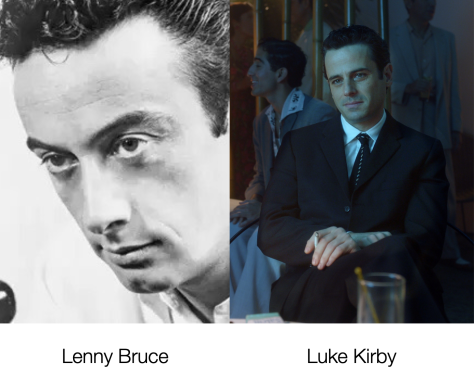
One of my favorite parts of this show is how the creators intertwined real-life with fiction. Lenny Bruce, a famous stand-up comedian that became known for his affinity to openly criticize American society through clever satire, is a character on the show and, in fact, becomes a friend of Midge and helps her traverse the show business. In real life, Lenny Bruce was arrested for obscenity countless times. Bruce was a trailblazer for comics after him who were interested in counterculture and he is known today as one of the pioneers of freedom of speech in the USA. Luke Kirby, the actor that interprets Bruce in Mrs. Maisel, does a fantastic job in embodying the spirit of the renowned comic. In the show’s second season, there is a recreation of Bruce’s famous appearance on The Steve Allen Show in 1959 that proves the talent Kirby has in bringing him to the screen. (I’d encourage anyone to watch both the original by Bruce and the recreation by Kriby!)
Another one of the best parts, in my opinion, of The Marvelous Mrs. Maisel is Midge’s outstanding femininity in a business dominated by men. In this manner, she reminds me of Beth Harmon from The Queen’s Gambit, whom never let go of her love for fashion while competing in ches
s against men who hold that nobody interested in such girly things should be any good at the game. Having portrayals of feminine women succeeding in masculine fields is refreshing because it seldom happens; in many movies, the talented, gifted, “I’m-not-like-other-girls” girls let go of their femininity to stand out. They hate the color pink, love cars, only wear sneakers, never wear dresses, etc. Letting go of your femininity is not a prerequisite to succeed in a field that seldom welcomes women. Neither is embracing it, but since it is sometimes frowned upon to do so, it is stimulating to see Midge Maisel on the road to success without letting go of that essential part of her character.
She is surrounded by men, masculinity, and a lack of feminine embrace as she ventures into the world of stand-up. Naturally, in this time, the men were the ones dominating in stand-up comedy as the talent and the business managers. Those in the business who weren’t men were man-like or not feminine at all. Midge’s lovable manager, Susie Myerson, is an outcast in everyday New York society because she does not dress like a girl. Throughout the show, her character is misidentified for a man or a little boy. The other female comic in the show, Sophie Lennon, disregards her femininity in order to succeed on-stage, creating a persona that convinces her audience that she is different, original, and quirky. She puts on fat suits, acts clumsy, and dresses in ragged house suits as to look dumber than she really is.
Despite all this, Miriam Maisel shows up to her gigs in beautiful, elegant cocktail dresses. She is a makeup expert, and a shopaholic; she own so many clot
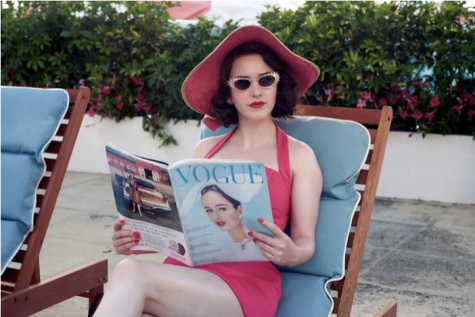
hes that she needs an extra room to put them all in. She is somewhat materialistic, one could even say, for anything pretty. But this booming femininity does not die down on stage. It is a part of who she is and, rather than letting it go to be a better comic, she embraces it to be as good as she possibly can, and she doesn’t let the lack of femininity in that show business discourage her in any way from being herself.
When I sat down on my living room sofa with my mom and decided to casually give The Marvelous Mrs. Maisel a shot, I was not expecting such an incredible watching experience. Much like The Queen’s Gambit is not really about chess, Mrs. Maisel is not about stand-up. It is about transformation, friendship, family, boldness, and laughter. The series is a breath of fresh air—a comfort-show. It makes you think, laugh, smile, and sometimes even cry. (Tears of joy, that is!)
The moral of the story? Next time your friend’s mom recommends something, don’t wait six months to give it a shot. Chances are you’ll be pleasantly surprised.
Bibliography
Ross, Eric B.. “Lenny Bruce”. Encyclopedia Britannica, 9 Oct. 2021, https://www.britannic
a.com/biography/Lenny-Bruce. Accessed 11 January 2022.
Image Links
https://variety.com/2020/tv/news/marvelous-mrs-maisel-music-video-emmys-1234644848/amp/
https://es.m.wikipedia.org/wiki/Lenny_Bruce
https://worldofwonder.net/mancrushmonday-the-marvelous-mrs-maisels-lenny-bruce-luke-kirby/
Your donation will support the student journalists of The Baldwin School of Puerto Rico. Your contribution will allow us to purchase equipment and cover our annual website hosting costs.

Hello, my name is Caridad Álvarez and I am this year’s editor-in-chief. I am in my senior year and I have been contributing to the Bullseye since ninth...

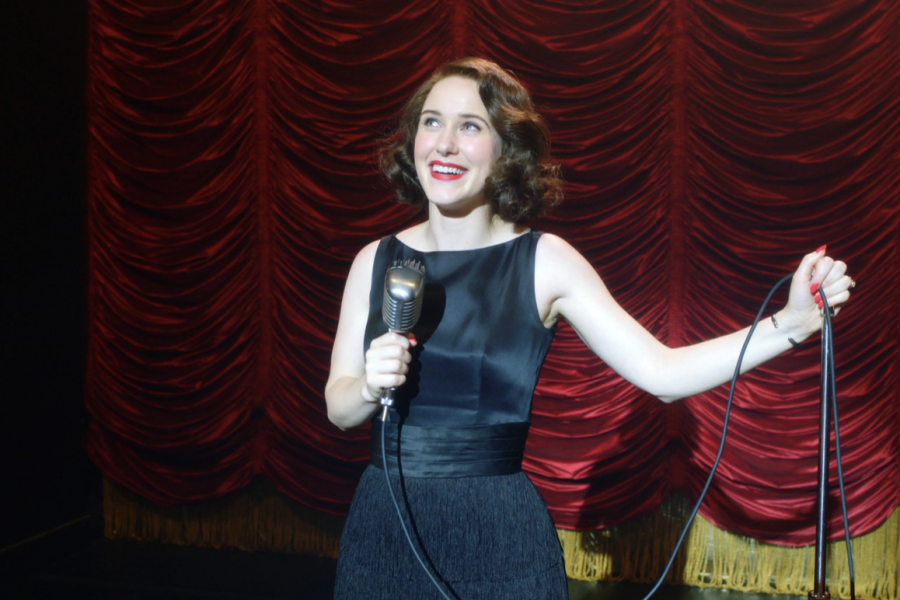


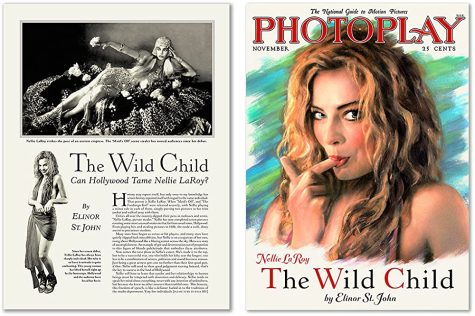
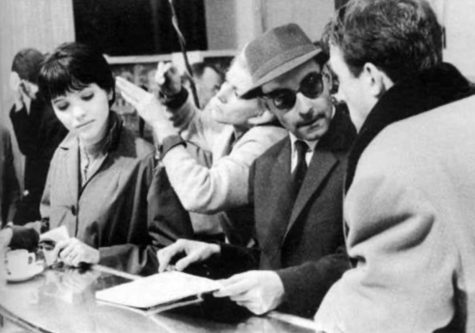

Zacha M. Ortiz-Correa • Mar 18, 2022 at 3:04 PM
Caridad, thank you for sharing your thoughts about this show. I agree with your takeaway from the show and how everyone should watch it since it is a feel-good series. It has been one of my favorite shows since it got out.
Caridad • Mar 21, 2022 at 5:33 PM
Thank you for reading! I hope you enjoyed the new season.